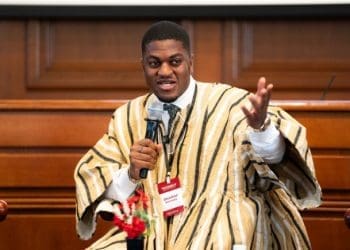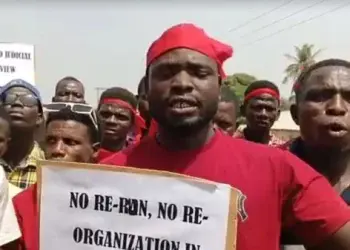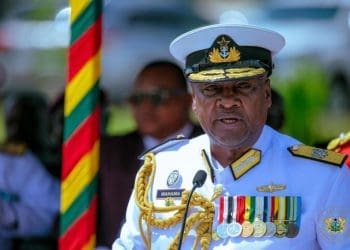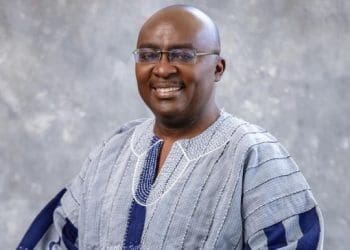Ghanaians from all walks of life converged at the Black Star Square in Accra on Friday, August 29, 2025, to mark the one-week observance of the late highlife maestro, Charles Kwadwo Fosu, popularly known as Daddy Lumba.
The solemn yet celebratory gathering drew hundreds of mourners, including stalwarts of the creative arts industry, political leaders, business personalities, and ordinary fans whose lives had been touched by the rhythms, lyrics, and legacy of one of Ghana’s most enduring music icons.
The Square, symbolic of Ghana’s pride and resilience, was transformed into a stage of remembrance where music, dance, and tributes intertwined to honour a man whose artistry defined generations.
Large banners and portraits of the late musician adorned the venue, while loudspeakers echoed his timeless classics, reminding attendees of the indelible mark he left on the nation’s cultural fabric.

A celebration of music and legacy
The event unfolded as both a memorial and a concert, capturing the spirit of Daddy Lumba’s life. Artistes spanning different generations of Ghanaian music graced the stage to perform emotional renditions of their songs.
Highlife veteran Amakye Dede, rapper Sarkodie, and singers Kofi Nti and Bless, among others, delivered stirring performances that drew tears, cheers, and spontaneous dancing from the crowd.
For many, it was more than a tribute; it was a reliving of memories shaped by the late legend’s melodies.
Each performance reignited the energy of songs like ‘Makra Mo’, ‘Akwanoma’, ‘Mensei Da’, ‘Sika’ and the ever-controversial but much-beloved ‘Aben Wo Ha’.

“Lumba was not just a musician; he was a cultural institution,” Amakye Dede declared on stage, his voice heavy with emotion. “He sang about our struggles, our joys, our relationships, and our identity as Ghanaians. His voice will never die.”
An outpouring of emotion
The atmosphere at the Square was emotionally charged, as mourners reflected on a career that spanned more than four decades.
Fans, many draped in Lumba-branded T-shirts and carrying placards with lyrics from his songs, could be seen singing along word-for-word.
Tears flowed freely as speakers recounted the personal and national significance of his music.
Family representatives, in brief remarks, expressed gratitude for the overwhelming support shown since the passing of their beloved relative.
They assured the public that a state-assisted funeral would be held in the coming weeks, alongside other commemorative activities, to ensure the legend receives a farewell befitting his stature.
“Daddy Lumba gave so much to Ghana and to the world. His music brought us together and gave us an identity. It is only right that Ghana gives him a proper national send-off,” one family spokesperson said.
The final curtain call
Daddy Lumba passed away on August 8, 2025, after a prolonged illness.
His death sent shockwaves across the country and the diaspora, with tributes pouring in from fans, colleagues, politicians, and international admirers.

For many Ghanaians, his passing represented the end of an era in highlife, a genre that has been the heartbeat of the nation’s music for decades.
Born on September 29, 1964, in Nsuta in the Ashanti Region, Charles Kwadwo Fosu rose from humble beginnings to become a household name, revolutionising the highlife scene with his unique blend of storytelling, rhythm, and vocal mastery.
Over the years, he released more than 30 albums, many of which became instant classics and shaped the soundscape of Ghanaian music.
His songs often pushed social boundaries—sometimes controversial, always thought-provoking, but undeniably captivating.
From the romantic balladry of Makra Mo to the playful mischief of Aben Wo Ha, Daddy Lumba consistently redefined the meaning of entertainment, embedding his artistry in the everyday experiences of Ghanaians.
A national icon remembered
Beyond music, Daddy Lumba symbolised resilience, creativity, and the power of self-reinvention.
His collaborations with other Ghanaian greats, such as Nana Acheampong in the Lumba Brothers days, introduced a fresh wave of highlife that appealed across age groups and continents.
His ability to reinvent his style while staying rooted in Ghanaian tradition ensured his relevance through shifting eras of musical taste.
Tributes at the observance of Daddy Lumba echoed this sentiment.

Sarkodie described him as “the father of modern Ghanaian music,” crediting Lumba for paving the way for contemporary artistes to find international acclaim. Music producer Zapp Mallet called him “a genius whose sound cannot be replicated.”
As Ghana prepares for Daddy Lumba’s final funeral rites, the nation continues to grapple with the void left by his passing. Plans for commemorative concerts, exhibitions of his works, and community outreach programmes in his honour are expected to be rolled out in the coming weeks.
For now, however, Ghanaians remain united in grief and gratitude, finding solace in the melodies he left behind. At the Black Star Square, the final note of the evening came not from a performer but from the crowd itself—thousands of voices rising in unison to sing Theresa Abebrese, one of Lumba’s most cherished ballads.
It was a reminder that though the man is gone, the music lives on.












